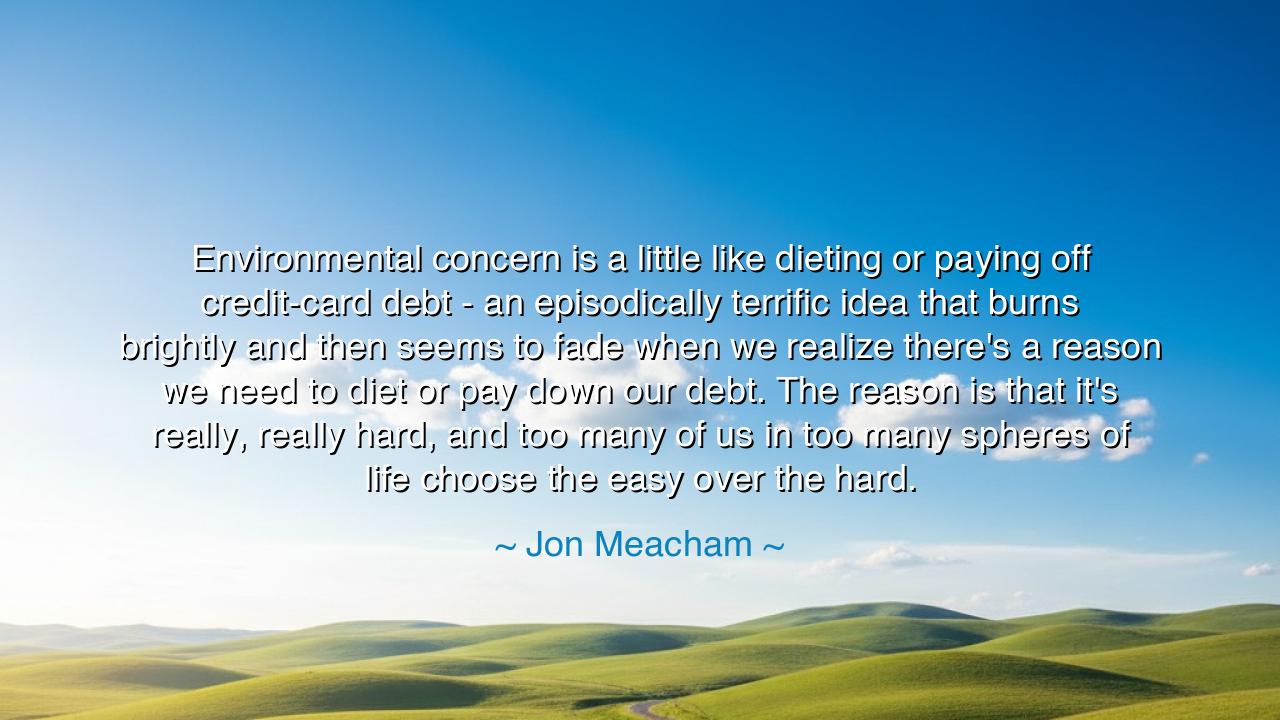
Environmental concern is a little like dieting or paying off
Environmental concern is a little like dieting or paying off credit-card debt - an episodically terrific idea that burns brightly and then seems to fade when we realize there's a reason we need to diet or pay down our debt. The reason is that it's really, really hard, and too many of us in too many spheres of life choose the easy over the hard.






"Environmental concern is a little like dieting or paying off credit-card debt — an episodically terrific idea that burns brightly and then seems to fade when we realize there's a reason we need to diet or pay down our debt. The reason is that it's really, really hard, and too many of us in too many spheres of life choose the easy over the hard." – Jon Meacham
In these words, Jon Meacham, a historian of both ideas and conscience, lays bare a timeless truth about the human condition. His message, though spoken in the language of the modern world, echoes the ancient struggles of the soul: the tension between ease and effort, between fleeting intention and steadfast perseverance. He likens environmental concern to dieting and paying down debt—not to belittle it, but to reveal the shared human weakness that undermines all noble endeavors. We begin with zeal, with conviction blazing like a torch, yet when the fire’s heat demands endurance, it is extinguished by the winds of fatigue. His warning is both simple and eternal: doing what is right often begins with inspiration but survives only through discipline.
The origin of this wisdom lies deep in the history of humankind’s struggle to govern its own impulses. From the earliest civilizations, people have known that what sustains the world—order, justice, harmony—requires sacrifice. The ancient Greeks taught that virtue lies in the mastery of desire, that one must choose the path of arete, or excellence, even when it is the harder road. Meacham’s metaphor is a modern reflection of this ancient principle. To preserve the earth, to manage our consumption, to repair the damage done by neglect—all these demand not brief acts of passion, but long seasons of endurance. Like the one who diets or repays debt, we must daily deny the temptation of comfort for the sake of a greater good.
His words also reveal the tragedy of our age: that in seeking ease, we sacrifice the future. We consume without restraint, comfort ourselves with illusions, and delay what is difficult until it becomes unbearable. The earth suffers, the climate changes, and yet we move as though time were infinite. Meacham’s insight pierces this illusion. He tells us that our failure is not of understanding, but of will. We know what must be done, just as the debtor knows he must pay, and the one burdened by excess knows she must eat wisely. Yet knowing is not enough. Knowledge without endurance is like a seed that is never watered.
Consider the story of Sisyphus, the mythic king condemned to push a stone uphill for eternity, only to see it roll back down each time he neared the summit. Though the gods meant this as punishment, it holds a lesson for humanity. For Sisyphus, though trapped, continues his labor. He endures. Meacham’s call to environmental stewardship, to self-discipline, to courage in the face of difficulty, is a call to become like Sisyphus—but not in futility. We, unlike him, have the chance to move the stone a little farther each generation, if only we persist. The task is hard, yes, but it is the hardship itself that gives it meaning.
Throughout history, the great transformations of civilization have not come from ease, but from struggle. The abolition of slavery, the creation of democracy, the preservation of peace—all required that men and women choose the hard over the easy. So it must be with the care of the planet, the restraint of appetite, the paying down of our spiritual and ecological debts. When Meacham says that environmental concern “burns brightly and then fades,” he is describing not just a social pattern, but a spiritual one: our tendency to prefer comfort to character. The call, then, is not only to protect the world, but to discipline the heart that grows weary in the face of effort.
The lesson is both humbling and profound: every lasting good demands persistence. Whether it be the healing of the earth, the mastery of the self, or the correction of injustice, progress is not born in moments of enthusiasm but in years of steady labor. To choose what is right over what is easy is to act with wisdom; to do so again and again, even when unseen, is to act with greatness. Let us therefore not measure our virtue by the brightness of our beginnings, but by the endurance of our devotion.
And so, Meacham’s words should not discourage, but awaken. The hard path is the path of legacy. Just as the dieter finds strength not in denial but in purpose, and the debtor finds peace not in avoidance but in discipline, so too must we find hope not in brief campaigns of concern, but in the lifelong stewardship of what sustains us. Let every act of care—every tree planted, every habit reformed—be a stone laid in the foundation of the future.
Thus, remember this truth: the earth, like the soul, is healed not by fleeting passion, but by enduring faithfulness. The hard things are the sacred things. To choose them is to stand with every generation that has struggled for what is right. Let us then, as Meacham implores, reject the tyranny of ease, and embrace the difficult with courage—knowing that in this struggle lies not only our survival, but our honor.






AAdministratorAdministrator
Welcome, honored guests. Please leave a comment, we will respond soon